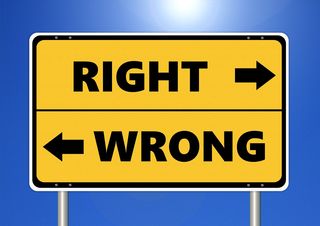Ethics and Morality
Weaponized Ethics Complaints Against Clinicians
A new strategy to suppress speech that people dislike.
Posted July 19, 2019 Reviewed by Ekua Hagan

A few years ago, in the midst of a tiresome social media flame war, an online mob decided that my views were problematic, and suggested, “He’s a licensed psychologist and if those are his views, he shouldn’t be seeing patients. We should all file licensing complaints with his Board.”
To be clear, the issues they were upset about were related to comments or opinions expressed online, about issues unrelated to my practice as a psychologist. But that comment sent chills down my spine. It wasn’t the first, nor the last such comment. For years now, I’ve been a bit of an unintended lightning rod for complaints about my clinical views.
When I first began publishing challenges to the sex addiction industry, I received countless threats and complaints, from people and colleagues who felt that my criticisms somehow reflected unprofessional behavior and clinical deficiencies in my practice. Some of these threats escalated to threats that license complaints would be filed against me, to take away my ability to practice as a psychologist, for holding these unpopular opinions.
These threats come from activists on all sides of the political and social aisle. I’ve received similar intimidation from antiporn activists, disgruntled that I publicly disagree with them, and saying to me in emails, “We also suspect that the Psych Board may be interested in hearing that its members are publicly libeling others.” (To be clear, those accusations of libel related to public statements of facts, which others would prefer remain secret…)
In the midst of such complaints, clinicians like myself are often silent, for fear of legal jeopardy, fear of inflaming problems and getting increased complaints, or simple embarrassment and shame. As licensed clinicians are using social media to engage with the public, to educate, inform, and to fulfill our ethical duties to advocate for social changes in support of behavioral health, we are running afoul of people who strongly disagree with our views. Sexuality issues appear to be a particular hotbed for these types of disagreements.
As I’ve researched this troubling dynamic, I’ve come across numerous similar examples amongst my colleagues:
- A fellow psychologist had a Board complaint filed against them by antiporn activists (some of the same ones who routinely threaten me), a complaint rooted in simply making public statements of disagreement about claims of damage from pornography use. That complaint, unrelated to any patient care, is still lingering unresolved, years after it was filed, and includes claims that the complainants knew had already had been dismissed by another oversight body;
- After a social worker publicly criticized and challenged therapists who support gay reparative/conversion therapy, the gay therapist received a long, threatening letter, as well as a complaint to both their licensing board and the ethics panel of their professional association. Because the complaint didn’t involve patient care, their licensing board declined to review it. The professional association reviewed the complaint, but also excluded it as non-germane to their ethical purview. "I was really frightened. I'd never received such a letter from a lawyer's office. The intimidation tactic worked because I was terrified."
- A therapist who counsels teens, and has taken a public stance that some teens who identify as transgender may desist in this identity (a controversial statement which is actually very strongly supported by research), received a complaint to their Board, that they were engaging in unethical “conversion” treatment and promoting a message that being transgender was unhealthy.
- Another therapist who used their website and discussion groups to offer support to LGBT teens, received a complaint to their Board that the therapist was illegally practicing across state lines, by providing teletherapy. (The issue of teletherapy is a complex, inconsistent issue with no clear guidelines for therapists to follow…)
- A therapist responded in a Facebook thread, explaining the distinction between pedophilia and sexual abuse of children. Outraged commenters accused the therapist of protecting pedophiles, excusing child abuse and threatened to contact the therapist’s board, believing somehow that their comments indicated that they engaged in malpractice in their clinical work.
- A psychologist who researches pedophilia and speaks about it to the media, received similar complaints and threats, “You shouldn’t be allowed to see patients if that’s what you believe!” The researcher offered the complainers a link to the relevant Board’s complaint process. No complaint was ever filed.

Just a few days ago, on Twitter, I observed a prominent activist, herself a licensed physician, criticize a politician who is also a physician, for his views on Trump’s recent statements about the four female Congresswomen. “I wonder what the medical board would think of this tweet?” the activist asked. “Is (sic) public displays of racism consistent with their code of ethics?”
Keeping the complaint process accessible is meant to help protect patients, although it has the unintended effect of weaponizing complaints. Of course, anyone who legitimately believes a therapist may be acting in violation of ethical standards should be able to file a complaint and allow the board to make a determination.
According to a nursing organization, license complaints about social media posts or interactions are increasingly common, and there are 30 times more licensure complaints than malpractice suits. Some licensure boards have changed requirements regarding complaints against licensed individuals, requiring that such complaints can only be filed by current or former patients.
But, boards and ethics commissions often struggle to sort out when a complaint, even one that appears to be frivolous, might be the tip of the iceberg, and an indicator of much bigger problems by a licensee.
As a result, when clinicians receive such license complaints against them, they must take care to respond carefully, thoughtfully, and deliberately. Preserve documentation about interactions related to these matters. When one such complaint is dismissed, these angry activists sometimes move onto some other association or body and file a new set of complaints against you there. Having the information to show this pattern can help expedite resolution.
Notify your board and malpractice insurance as soon as such threats are made. Even if the complaints are never filed, it helps make these authorities more aware of these trends, and if they are filed, it helps that the board first heard from you. Be diligent to respond to the board inquiry in a professional, calm manner. When you’ve been accused of being unprofessional online, responding to a board inquiry with an outraged tirade does nothing but prove the point of the complaint.
Be thoughtful in general, in online communications, ensuring that even when discussing something that is controversial, you never stray into anything which might constitute a violation of patient confidentiality, as such a misstep is guaranteed to result in legitimate board action.
Recognize that even if the board may find nothing of substance in the complaint itself, through the investigation, they may uncover other things that they decide require action and formal response.

Licensed clinicians hold the same right to free speech as held by other citizens. And, in several cases, attempts by boards to sanction licensees for their speech have been overcome by legal appeal to the First Amendment.
In Kentucky, in 2017, a psychologist complained to the Kentucky board, about another psychologist who wrote an advice column published in a Kentucky newspaper. The Kentucky board issued the advice columnist a cease and desist letter. Ultimately, the board lost this fight, when the columnist challenged on the basis of free speech.
But, unfortunately, such appeals are onerous and expensive. For now, those of us who advocate for unpopular opinions have to accept some risk for voicing our opinions. When I first began speaking out against the sex addiction industry, countless colleagues told me they’d always felt similarly but kept silent for fear of complaints and threats.
As a result of my advocacy, many people are now speaking up about these concerns, and complaints that my criticisms are aberrant and unprofessional have stopped. As more of us speak up, using professionalism and reason, license and ethics boards will have to wrestle with the lines of what they can enforce, and set more clear boundaries around such complaints, updating ethical and professional guidelines.
One additional thing I noticed in this review: A significant percentage of these threats are made by other licensed clinicians who, so outraged by their disagreement with us, feel justified in using these complaint tactics. We, as clinicians, may all need to get better at tolerating dissent and disagreement with our colleagues, even over incendiary issues.
My sincere appreciation and admiration to colleagues who anonymously shared their stories with me.
"Ethics codes cannot do our questioning, thinking, feeling, and responding for us. Such codes can never be a substitute for the active process by which the individual therapist or counselor struggles with the sometimes bewildering, always unique constellation of questions, responsibilities, contexts, and competing demands of helping another person…Ethics must be practical…Ethics that are out of touch with the practical realities of clinical work, with the diversity and constantly changing nature of the therapeutic venture, are useless." (Pope & Vasquez, Ethics in Psychotherapy & Counseling, 5th Edition)




